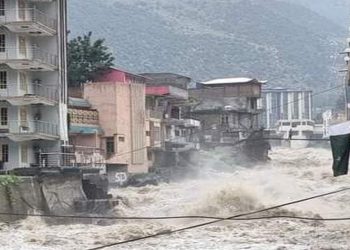WAHINGTON: US federal health agencies recommended pausing use of Johnson & Johnson’s COVID-19 vaccine after six women under age 50 developed rare blood clots after receiving the shot.
Johnson & Johnson said it would delay rollout of the vaccine to Europe, a week after regulators there said they were reviewing rare blood clots in four recipients of the shot in the United States.
Acting US Food and Drug Administration Commissioner Janet Woodcock said the agency expected the pause to be a matter of days, and was aimed at providing information to healthcare providers on how to diagnose and treat the clots.
The moves come after European regulators said earlier this month they had found a possible link between AstraZeneca’s COVID-19 vaccine and a similar rare blood clotting problem that led to a small number of deaths.
FDA official Peter Marks said the J&J cases were “very similar” to the AstraZeneca ones. He said there had been no similar blood clot cases reported among recipients of the Moderna or Pfizer-BioNTech vaccines, which use a different technology and accounted for the vast majority of US vaccinations so far.
J&J’s single-dose shot and AstraZeneca’s low-cost vaccine are seen as vital weapons in the fight against a pandemic that has claimed more than three million lives. The FDA said there had been one reported death from the rare blood clotting condition among recipients of the J&J vaccine, while another person was in a critical condition.
The White House said appointments to receive the J&J shot were being rescheduled across the country to the other two authorised vaccines, and that there was enough supply of Pfizer and Moderna shots to reach President Joe Biden’s goal of administering 200 million shots during his first 100 days in office.
J&J’s vaccine rollout has been limited by production issues. As of April 13, 7.2 million doses of the J&J vaccine had been administered in the United States compared with 185 million of the other two.
All six cases involved women between the ages of 18 and 48, with symptoms occurring six to 13 days after vaccination. The FDA said patients should watch for up to three weeks for symptoms including severe headache, abdominal pain, leg pain or shortness of breath.
In the cases, a type of blood clot called cerebral venous sinus thrombosis (CVST) was seen in combination with low levels of blood platelets, or thrombocytopenia. J&J said it was working closely with regulators and noted no clear causal relationship had been established between the clots and its vaccine.
The J&J and AstraZeneca vaccines both use an adenovirus – a harmless cold virus – as a vector to deliver instructions for human cells to produce a protein found on the surface of the coronavirus, spurring the immune system to recognise and attack the actual virus.
Chinese and Russian COVID-19 vaccine developers CanSino Biological and Gamaleya Institute also rely on this approach. The Pfizer-BioNTech and Moderna vaccines use messenger RNA (mRNA) technology.
The European Medicines Agency (EMA) recommends AstraZeneca’s COVID-19 vaccine, saying the benefits outweigh the risks. Several EU countries, however, have limited its use to certain age groups.

































